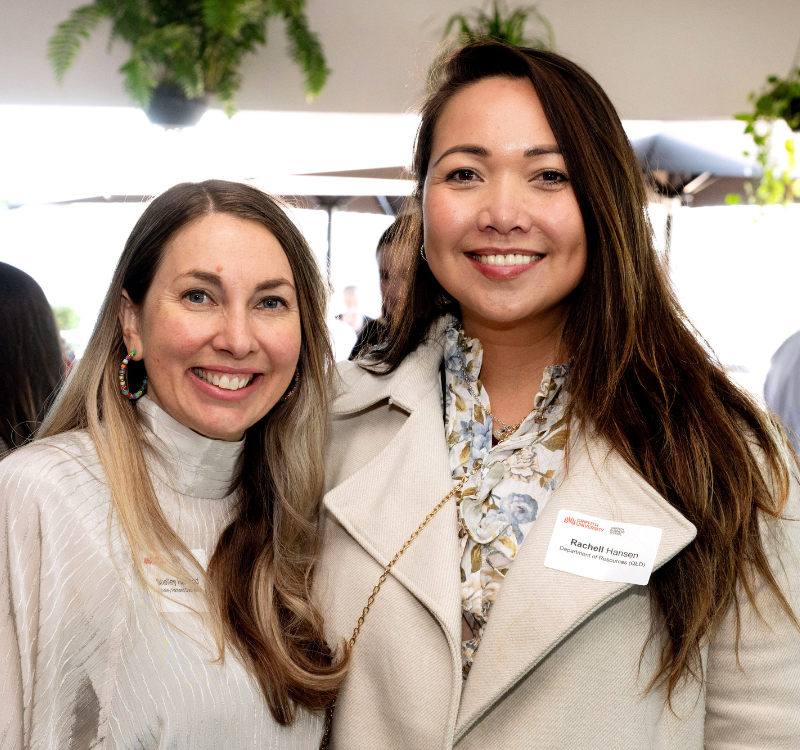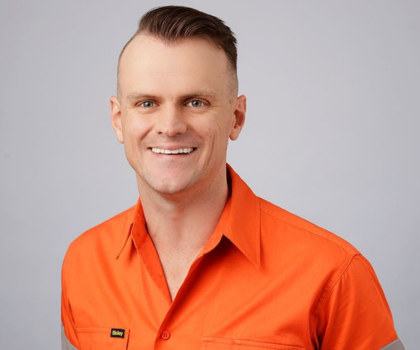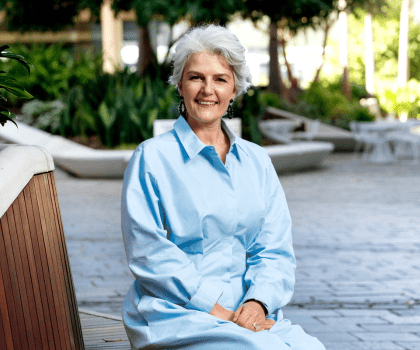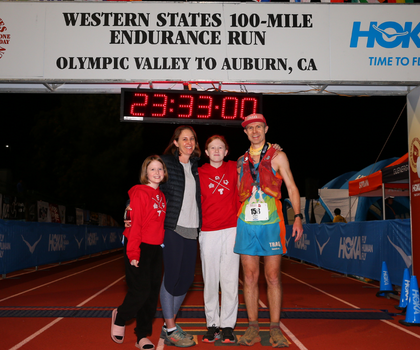
Rachell Hansen is currently completing her MBA studies, with only two courses remaining. We, the MBA Team sat down with Rachell to explore her professional journey in the public and not-for-profit sectors. Rachell also talks about her MBA experience, in and outside the classroom.
You are the Acting Manager of the Future Economy & Strategy Team in the Department of Resources (Queensland). What is your core business in this position?
The Future Economy and Strategy team is a newly established team within the Department of Resources’ Georesources Policy area. Our role is to support the department and the resources sector to successfully navigate the transition to zero net emissions and a circular economy. Our team’s functionality includes:
- Coordinating the department’s broader climate-related strategic agenda, covering complementary issues like emissions reduction, climate adaptation, climate risk and influencing sustainability practices across the organisation.
- Collaborating across government and the department to implement the Queensland Resources Industry Development Plan and Critical Minerals Strategy actions on emissions, ESG (environmental, social and governance) and circular economy.
- Influencing, and providing advice on, whole-of-government reforms that affect the sector’s emissions profile, circularity, and ESG credentials.
- Building a detailed understanding of the sector’s emissions profile, and opportunities and barriers to reducing emissions and becoming more circular.
- Building capacity across the department to better support and enable industry in emissions reduction, circularity, and ESG.
What are you and your team doing to strengthen the ESG credentials of Queensland’s resources industry?
As published in Queensland Critical Minerals Strategy, the Queensland Government will work with industry to improve their ESG performance and reporting to ensure best practice and the ability to meet anticipated future requirements from consumers, investors, local communities and First Nations peoples.
- The Queensland Government will also partner with industry to develop an ESG network to develop initiatives, which may include:
- Events aimed at upskilling and equipping mining companies to better demonstrate ESG credentials
- Presenting an annual ESG Excellence in Mining award
- Collaborating and sharing research and methods that improve ESG practices
This body of work is led by the Reform division in our agency and given how complementary it is to the work we do in the Future Economy and Strategy team; we are leaning in to support this function.
How would you describe your leadership style?
During my career, I have encountered both ineffective bosses and inspiring leaders. I recognise the profound impact leaders can have on the lives of others, and I strive to ensure that my impact is positive and lasting.
Creating a positive team culture that empowers individuals and provides a safe and supportive environment for growth is my core philosophy. That the people I lead don’t just come in to do the work but love coming to work.
My leadership style has largely been shaped by my personal experience, my volunteer work in the community and my professional development through programs like the Department of Resources' LeadR Program and Griffith University’s MBA Program. It combines strength-based, values-based, and transformational leadership approaches, always prioritising the human factor.
My experience leading the World Economic Forum's Global Shapers Gold Coast Hub allowed me to establish a team and shape our culture from the very beginning. Unlike traditional hierarchical structures, I aimed for a more fluid and flat-level team, where collaboration and grassroots projects were prioritised over status and titles. I wanted every team member to believe in their own leadership capabilities and redefine what leadership means. That leadership isn’t a cookie-cutter mould of what we’ve grown up to see, but what we think it can be.
To guide the team, I developed the REAP and SOW? model. This model emphasises the aspects within our control as individuals and leaders. It stands for Respect and Respond, Energy and Empathy, Accountability and Action, and Passion and Purpose. It reminds us to choose kind and successful responses, give positive energy to our work and colleagues, take responsibility for our actions, and pursue projects aligned with our passions and purpose.
On the other hand, SOW? highlights the strengths and weaknesses of our team members. It is not about pointing out shortcomings but rather encouraging introspection. During the onboarding phase, I ask team members to reflect on the strengths and weaknesses they are interested in overcoming. This allows for task allocation based on strengths and provides opportunities for personal growth in a safe and supportive environment to help them build that capability and in turn, their confidence and competence in an area they are intrinsically motivated to grow in.
As a symbolic gesture, I gift each team member a young native tree after the onboarding stage. I explain that the tree represents their leadership and ultimately shows up in the results they get if they nurture it and provide the right conditions for its growth. Just like the tree, their efforts can lead to thriving results, or neglect can cause it to fade away.
Where do you see yourself in five to ten years?
In the next 5 - 10 years, we can expect significant changes to our world due to rising global temperatures. My ultimate goal is to play a role in influencing and promoting positive action on climate change, fostering smarter, more dedicated, and faster efforts. I firmly believe that working in government and utilising policy levers provides an excellent platform to drive meaningful change. However, this journey must also involve collaboration with industry and the broader community, who are at the heart of this change. Currently, I have the privilege of engaging in this rewarding work.
By envisioning a time frame of 10 years from now, my hope is that humanity will have successfully repaired and restored nature, enabling it to thrive rather than merely survive. I aspire to witness my children, along with younger and future generations, appreciating the beauty of the world around them.
Professionally, I aim to secure a position as a Chief Sustainability Officer or other influential leadership role within the government that focuses specifically on addressing climate change. In this capacity, I strive to cultivate an inclusive culture that values and respects individuals at all levels, embracing our diverse identities and intersections. It is essential to me that I serve as a role model, demonstrating healthy boundaries and nurturing relationships, regardless of one's position or rank.
Above all, my top priorities are health and well-being, as well as family. I hope that my future position will demonstrate that it is possible to hold a high-level role while still being present in the aspects of life that truly matter. This means dedicating quality time to the people we care about and finding solace in nature, allowing us to recharge and restore ourselves.
What or who inspired you to pursue an MBA?
The primary motivation behind my work is my two young boys. They drive me to ensure that they, as well as their children and future generations, inherit a better world to live in. I am committed to doing all I can to make that a reality.
In 2019, I had the opportunity to participate in Former US Vice-President Al Gore's Climate Reality Leadership Corps training in Brisbane. This transformative experience opened my eyes to the gravity of climate change. Through a compelling presentation, involving over 500 slides and hours of discussion led by environmental experts, I gained a profound understanding of the science and economics driving global temperature rise. It was a stark wake-up call that underscored the urgent need for change if we continued with business as usual.
Since then, I have made a personal pledge to dedicate myself to this cause. I founded the World Economic Forum's Global Shapers Gold Coast hub and commenced working at the Department of Resources a week later, recognising that change occurs most effectively when we can influence it from within. It was crucial for me to gain a balanced perspective on the issues at hand to facilitate the consideration of effective solutions. I quickly learned that mining plays a significant role in the global pursuit of renewable energy. Rare earths for solar panels, metals for wind turbines, cobalt for battery storage, and critical minerals are essential resources required at an unprecedented scale. The challenge lies in ensuring responsible stewardship of these resources.
Undeniably, the task can be overwhelming at times, and the complexities and challenges can seem daunting. However, it gives me comfort to know that there are many passionate individuals out there who are equally dedicated to tackling this immense problem and giving their best efforts to make a difference.
What has been the highlight of your MBA journey thus far?
Throughout my MBA journey, the people I have encountered have been the highlight without a doubt. I have been consistently impressed by the kindness, passion, and dedication displayed by everyone involved, from the MBA team to the teaching staff, students, and alumni. Despite the predominantly online nature of my post-graduate and hybrid learning experience, it has been incredibly fulfilling and enriching.
The MBA team, under the leadership of Stephanie Schleimer, has truly set the standard for fostering an inclusive and supportive environment for students, alumni, and teaching staff. Their tireless efforts have led to the program being recognised with numerous local and global awards, a testament to their exceptional work.
On a personal and professional level, I have always appreciated the warm hospitality and genuine care demonstrated by the MBA team. They consistently go above and beyond to provide valuable content, networking opportunities, and resources, ensuring that the students, alumni and even the broader community can have an opportunity to continuously learn, engage, and stay connected. Their dedication has truly made a difference in my MBA experience.
And last but certainly not least, is there something you have read or listened to recently that has had an impact on you?
Absolutely! The recently published Future Normal book, authored by Nick Barter and Chris Fleming.
If you have a question for Rachell, we encourage you to connect on LinkedIn.
You may also like

Meet MBA Alumnus, Darrin Mackenzie
Darrin is the General Manager of ENZED and Co-founder of ReHose Solutions. In this interview Darrin reflects on the year that was, his personal and professional journey, achievements, and shares insights into his passion project for reducing supply chain risks.

Meet Deputy MBA Director, Dr Mirela Malin
Mirela is the Deputy Director of the MBA Suite and a Course Convenor. Read what she has to say about the the misconceptions of corporate finance and the MBA classroom experience.

Meet Adjunct Associate Professor, Michael Duggan
Michael is a valued member of the Griffith MBA Community, who shares his experiences and expertise with our students and alumni. In this interview, Michael talks about fatherhood, work-life balance and the importance of the Sustainable Development Goals (SDGs).